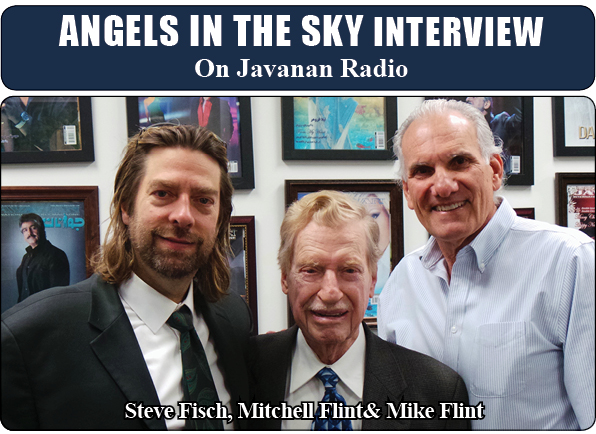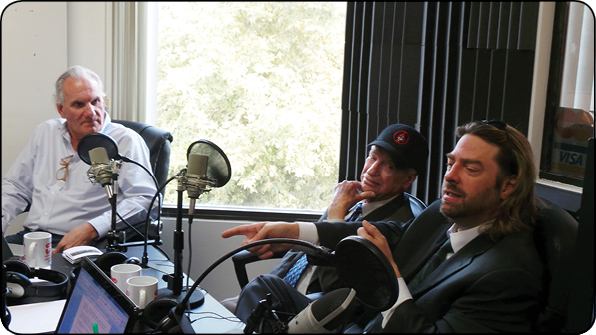
Below is transcript of an interview with Mitchell Flint, Mike Flint, and Steve Fisch who worked on the film Angels in the Sky
Masa: We have producers Mike Flint, Mitchell Flint, and Co-Producer Steve Fisch from the documentary feature film Angels in the Sky, which is about the birth of the Israeli Air Force in 1948. The story features the volunteer pilots, and we have one of them here, Mitchell Flint. He was a US Navy fighter pilot in World War II and volunteered as a pilot during the War of Independence in 1948.
Mitchell, you were a Navy pilot and your father was a pilot in World War I. Now, the third generation, Mike, is making a documentary about you and all the volunteers in Israel during 1948. Mike can you tell us why tell the story now and why is this an important time to tell the story?
Mike: It is a story that has never been told in a real way. It is perhaps one of the greatest stories of the 20th century that has never been told. Before these legends of Israel pass away, we need to memorialize them by making a film about them.
Masa: Steve, How did you get involved with Mike and what attracted you to this project?
Steve: Mike and I met at the UCLA Theater, Film, and TV Alumni Association. I was in the Navy Reserves as a Public Affairs Officer. He told me about his dad, and when Mitchell and I met, I fell in love with who he is and what his story was; the story of all the 150 aviators, who came from all around the world to help Israel in 1948. That is where it started many years ago and it has evolved over the years. There was a small 10 year gap in the project development because Mike decided to join the Naval Reserves.
Masa: Mike, why did you get involved in the Navy?
Mike: In large part because Captain Steve Fisch retired, also it was a family tradition, my father and grandfather, and the opportunity came for me to be a Direct Mission Officer in the Navy so I served for about 10 years.
Masa: Did you feel pressured to take this role or did you want to?
Mike: Not at all, I enjoyed it. When I joined I thought I would do it for a year, maybe two, but before I knew it ten years I had been serving my country and it was such an honor.
Masa: Did your experience serving have a direct influence on your wanting to tell this story?
Mike: I loved this project before I was in the Navy, but of course being a member of the military added a new dimension and an even greater appreciation for this story.
Masa: What is this story really about? It is not just about Israel in 1948, whose story are you really telling?
Mike: It is a humanity story, about a country that was dreamed about for two thousand years, and through many chance happenings, the opportunity for the creation of the Israel state came about.
Masa: How important was it that your father tell his story as part of this project?
Mike: Dad is a very modest guy and is not one to brag. I was born with this story and always heard about it. Most of his best friends were like uncles to me. I always dreamed of doing this story and this is the right place at the right time. Everything has to come together and having a Co-Producer and friend like Steve is right. It is amazing what it takes to put together a movie, but you just do it.
Masa: Mitchell, what was you experience like in making this film and talking about your story in such depth knowing so many people will hear it?
Mitchell: It meant a lot to me that Israel should survive because the United Nations set it up that Israel should be a country but other nations did not think it belonged. Since I had practice as an aviator, and I small part of me was adventurous. I joined the US Navy for the adventure and I wanted to be a pilot; to be able to use my skills for a good cause.
Masa: I was wondering if, during this process, you were able to reunite with some of the people you knew in 1948?
Mitchell: We always got together every 5 or 10 years. They became my friends, like brothers, and we got together often. We have the exploits that we did and we were happy to do them as it is a very important part of life.
I miss my friends who didn’t make it back and the ones who passed later. They all have meaning to me.

Masa: Steve, there were many people involved in this project and it seemed that while you were showing me the pictures that a connection developed between everyone involved in the project.
Steve: It was an unbelievable experience to meet with, talk with, and share with these amazing people, who for a variety of reasons came from around the world and gave their all to help this young country exist.
Masa: You were able to get in touch with all the fighter pilots from the War of Independence of 1948 and you traveled to different parts of the world. Previously you worked in TV production for 10 years, as well as legal affairs during Law School, did you utilize these skills to reach everyone and was this difficult?
Steve: To start with, Mitchell was one of the pilots and most of them were his friends so it was easy to track them down. A few had moved and not kept in touch, but with the reunions over the years we tracked them down. There was a tight network between these people, that through Mitchell and Mike we were able to reach and get a hold of them. They were all excited about the project.
Masa: Mitchell, I would like to hear more about how you worked with Danny Shapiro, the first Israeli to earn the rank of astronaut.
Mitchel: Danny and I had a mission together that was very dangerous. We flew over one of the invading countries, to take pictures of their airport. I took the pictures while Danny watched for planes to protect me. When I finished I looked for Danny but couldn’t see him, I was very nervous as to what happened to him, but I couldn’t wait so I started back to Israel. I looked around again and he was on my tail so we proceeded and the mission was completed. The scary part was if you had engine problems and had to land, it would have been very dangerous and unlikely you got out alive.
Masa: You must have had a commendatory and trust the people on missions like this. Did you have this with Danny before this mission?
Mitchell: All the fighter pilots were very close, like brothers, and there wasn’t very many of us. In World War II there were lots of pilots around; one squadron had five times the pilots we had. The main thing was that we had very experienced pilots. One of them flew with Pappy Boyington and was his second in command, Chris Magee. He was my roommate. But most of the pilots have succumbed to age by now.
Masa: Just this year, Mitchell received his rank and an honor that he was not able to accept while he was in the Navy.
Mitchell: I didn’t have anything to do with getting the honor. I was in Israel and someone else decided to arrange it because I had contributed to the State of Israel after World War II and they wanted to honor me. I could not accept it back then because I was in the US Naval Reserve.
Masa: This is one of concerns your mom had and why she did not want you to go. With you being her only son, you did not want to tell her about this dangerous mission, how did you cover it up?
Mitchell: I told her I was going to England for the 1948 Olympics, and didn’t tell her anything more than that. You don’t have to tell everything; just what you want them to know about is enough. I had relatives in England who sent her letters that made it appear I was still there.
Masa: What did you tell her when you came back?
Mitchell: She accepted it and was very happy that I was back. She was very proud of what I did and returned to her. She was relieved that she didn’t have to worry about what might have happened. I was shot at quite a bit, but I played my cards right and was very quick.
Masa: This story is 65 years old, why are there three films about it coming out now?
Steve: They are great ideas with spontaneous development. Each one is focused on something different from that period of time. Ours is about the 150 pilots from all around the world. It is a unique story about them, who they were, what their experiences were before going to Israel, and what they did in Israel. Some stayed a short period, some stayed a year, some settled in Israel. Their children grew up there, joined the Air Force, and became pilots. It is an amazing story about the successes and the sadness which happens in a time of war. This looks at all the sides and how they interacted. This motley group came to Israel and became cohesive. The language of the Israeli Air Force back then was English, not Hebrew, because all who came spoke English.
Masa: The other two films that come out in 2014 and 2015, one is directed and produced by the sister of Steven Spielberg. Is it true you are involved in the other one?
Steve : The other one is from a professor and film maker from the University of Florida, who is making it for TV. Our film is for the theaters, so it is different and a different kind of story. The other theater film is for the film festival circuit, but we are lucky to have direct theater release in several cities. We are excited about this fact and we expect to release during the second quarter of next year.
More information is available at www.AngelsInTheSkyTheMovie.com and on Facebook under “Angels in the Sky”.
Masa: You have some celebrity support, like Jerry Lewis and Pat Boone, who else is supporting your film?
Mike: We are very lucky that some celebrities found this story amazing and came aboard to endorse it. We have more than are posted on our website. We are proud of that. It is another reason I keep pushing this project to be the best it can be.
Steve: We are lucky the composing team is Allan Jay Friedman and his partner Jonathan Tunick.
Masa: Thank you gentlemen for coming.
For more information
about their film go to
www.AngelsInTheSkyTheMovie.

